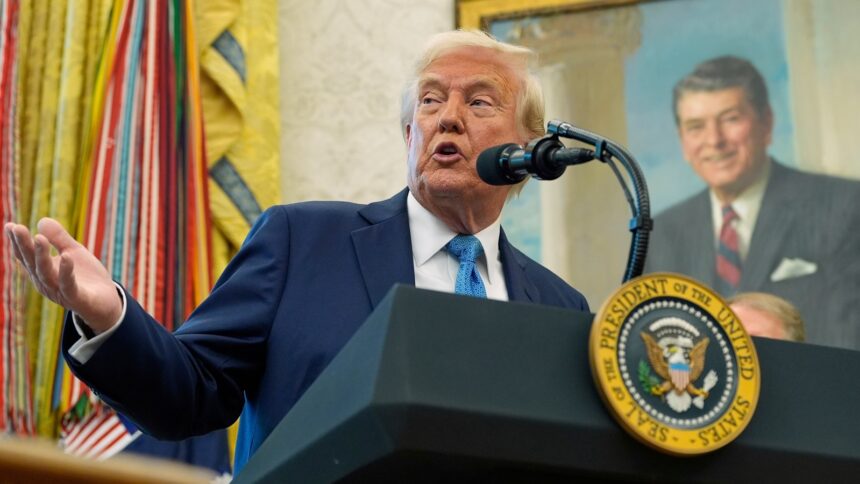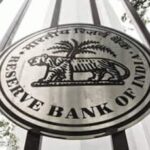US President Donald Trump has sparked off a global trade war by raising tariff walls on imports. While we are in the middle of a 90-day pause on the implementation of reciprocal tariffs where other countries are concerned — except a universal 10 per cent import duty rate — the US has imposed up to 245 per cent tariff on China with immediate effect. The latter retaliated by imposing 125 per cent tariff on US imports.
Trump’s decision to replace a rule-based global trading regime that was put in place with the setting up of the World Trade Organization by a regime of bilateral trade negotiations will be damaging for the American and the world economy, Former Union Finance Minister Yashwant Sinha, who held the post when ’s Atal Bihari Vajpayee was Prime Minister, said in an interview with Vikas Pathak. Dissatisfied with India’s attempt to strike a trade deal with the US, Sinha says India should have gone to the WTO, talked to like-minded countries and resisted Trump’s unilateralism.
How do you view the reciprocal tariffs US President is imposing on nations? While other countries await the end of the 90-day pause for tariffs to become operational, apart from a universal 10 per cent duty, the trade war is already here with the US imposing up to 245 per cent tariffs on China with immediate effect. China retaliated by imposing a 125 per cent tariff on US imports. Do you think what Trump is doing is sound policy for the US?
It’s certainly not a good policy either for the US or the world. It was after a great deal of effort that the international community agreed to a proper rule-based international trading order. For six years, trade talks went on between the countries of the world under the Uruguay round and after that there was a meeting of all the countries in Marrakesh, where the decision was taken to form the World Trade Organization (WTO).
Before that there was GATT, or General Agreement on Tariffs and Trade, which was also continuously trying to make the international trading order as rule-based as possible. There were difficulties, especially between the developed and the developing countries, where the demands were dissimilar and there was conflict of interest on various issues — and mainly on agriculture and intellectual property rights. It was after a great deal of effort that the world was able to agree on a workable solution.
This was finally arrived at in Marrakesh in Morocco in 1994, and the decision was taken to form the WTO. This agreement came into effect from January 1, 1995, as far as I remember. After that, all the trade disputes were being referred to the WTO, and the adjudicating body of the WTO used to decide the matter.
Now, the first challenge that Trump has mounted is to this rule-based international trading arrangement. For all practical purposes he has killed the WTO, which is playing no role. And all countries of the world, in particular the major trading partners of the US, are either negotiating a trade deal with the US at a bilateral level, like India is doing, or standing up to this unilateral action, like China or Canada. So, Trump has made a major mistake by challenging a global order that has been in existence for 30 years or more. He is out to make the international order based on consensus a thing of the past and believes in unilateralism. He is looking at bilateral trade balance. When you are trading with the whole world, you can’t say that I must have a bilateral balance with every country in the world. You lose some here, and gain some there, and then look at the final picture.
What do you think were the advantages of the rule-based global trade order? How will its undoing play out nationally and globally?
The whole world was busy lowering tariffs. As Finance Minister, I said in Parliament that we will bring tariffs down to Asean levels. I said this because if you raise tariffs you are making imports more expensive, and that will add to the cost of production in your country, which will raise prices and make your exports more costly. Domestic prices will also go up. So, it is not a good policy either for a country or for the world to raise tariffs… It hurts consumers the most in the country that is imposing those high tariffs and affects the global trading order. Trump is making a serious mistake and I am glad the pushback has started in the US against this.
How will the trade war impact China, the US and the world in general? There are already fears that China might begin to dump its products in other countries, including India. This might harm production in those countries by making their products uncompetitive. India has just imposed a 12 per cent safeguard duty on non-alloy and alloy steel flat products on account of dumping fears…
Every country has provision for anti-dumping duty, and if you feel that any country is dumping something in your country, you can legitimately levy anti-dumping duty. That device is available if China tries to dump anything. The other point is that in this war we are A minor PLAYER. China and the US are the major players, and much will depend on the outcome of this rivalry between China and the US. Already, China and the European Union are coming closer. When the global order changes, there will be new alignments. It is likely that the US will be isolated. I think in this wrestling match China will emerge the winner and might even overtake the US as the major trading partner for the world.
Are you satisfied with the way the Government of India has handled the Trump administration till now in context of tariffs?
There were options before every country. One option was that if you impose higher tariffs on us, we will reciprocate by imposing higher tariffs on you. The second way was that we will go out in the world and form alliances against you. The third was to negotiate and ask for mercy. India has opted for the third option. Internationally, we are not doing anything with friendly countries to stand up to the US. We are trying to negotiate a deal bilaterally which might, we think, bail us out. How far this will succeed I don’t know, but along with the US there is a great danger of India also getting isolated in the international community by this approach. In fact, India should have been in the lead role in the global community in negotiating with the US instead of negotiating a bilateral agreement.
But do you also see advantages accruing to India in some sectors as an unintended consequence of this trade war that we did not start?
Where will be the advantage? If at all there is some advantage, it will only be with the US. You remember the generalised system of preferences (GSP)? It’s a concept that is now forgotten, but India used to get GSP preferences under the WTO, and also from the US. America abolished it some years ago and we accepted it. So, gradually we have lost the advantages we had in the US market and the area vacated by us has gone to other countries.
What are the steps you think India should immediately take in response to Trump’s tariff war?
My personal preference will be for India to go to the WTO, insist on a rule-based global trading order, build an alliance of willing countries and face up to the situation. India has to face the situation with determination, not ask for mercy from the US. Where is the WTO in all this? Its only statement was that there will be no recession as a result of this. But it’s doing nothing against the unilateralism of Trump.
But isn’t it true that Indian stock markets have been relatively stable despite the global uncertainty?
The market reacts on a momentary basis. If at noon they feel that something has happened, it will either go up or go down. The markets did suffer as a result of the Trump tantrums. But now they are recovering in the hope that India will be able to negotiate a satisfactory bilateral agreement.
Apart from this, Trump has also begun to flag immigration, with statements being made regularly on the status of green card holders, the H-1B work visas and also F1 student visas. Out of 327 student visas revoked on various grounds, half the students are Indian. Given our huge diaspora in the US, how do you view the situation?
India will suffer. Trump is behaving like a bull in a China shop. India will suffer as our professionals will be at a disadvantage. But the US will also suffer because they were benefiting from our talent that was ready to work for them.
Vikas has taught as a full-time faculty member at Asian College of Journalism, Chennai; Symbiosis International University, Pune; Jio Institute, Navi Mumbai; and as a guest professor at Indian Institute of Mass Communication, New Delhi.
Vikas has authored a book, Contesting Nationalisms: Hinduism, Secularism and Untouchability in Colonial Punjab (Primus, 2018), which has been widely reviewed by top academic journals and leading newspapers.
He did his PhD, M Phil and MA from JNU, New Delhi, was Student of the Year (2005-06) at ACJ and gold medalist from University Rajasthan College in Jaipur in graduation. He has been invited to top academic institutions like JNU, St Stephen’s College, Delhi, and IIT Delhi as a guest speaker/panellist.








